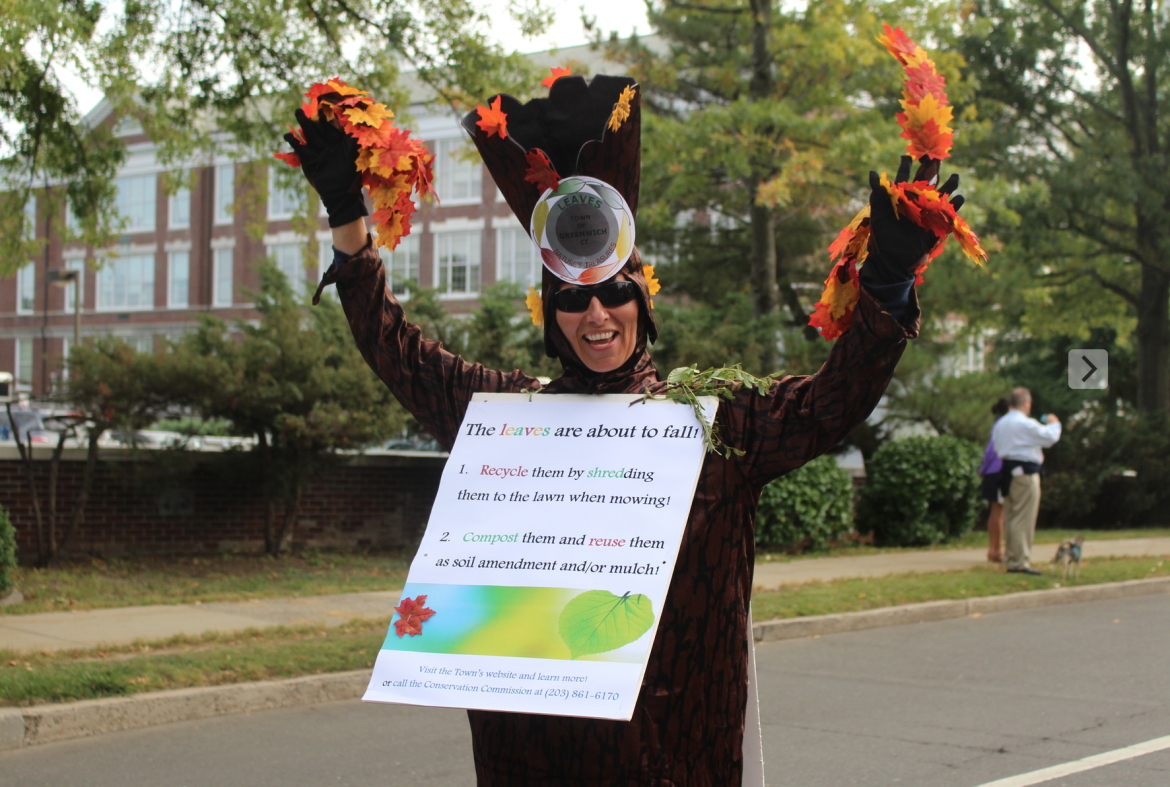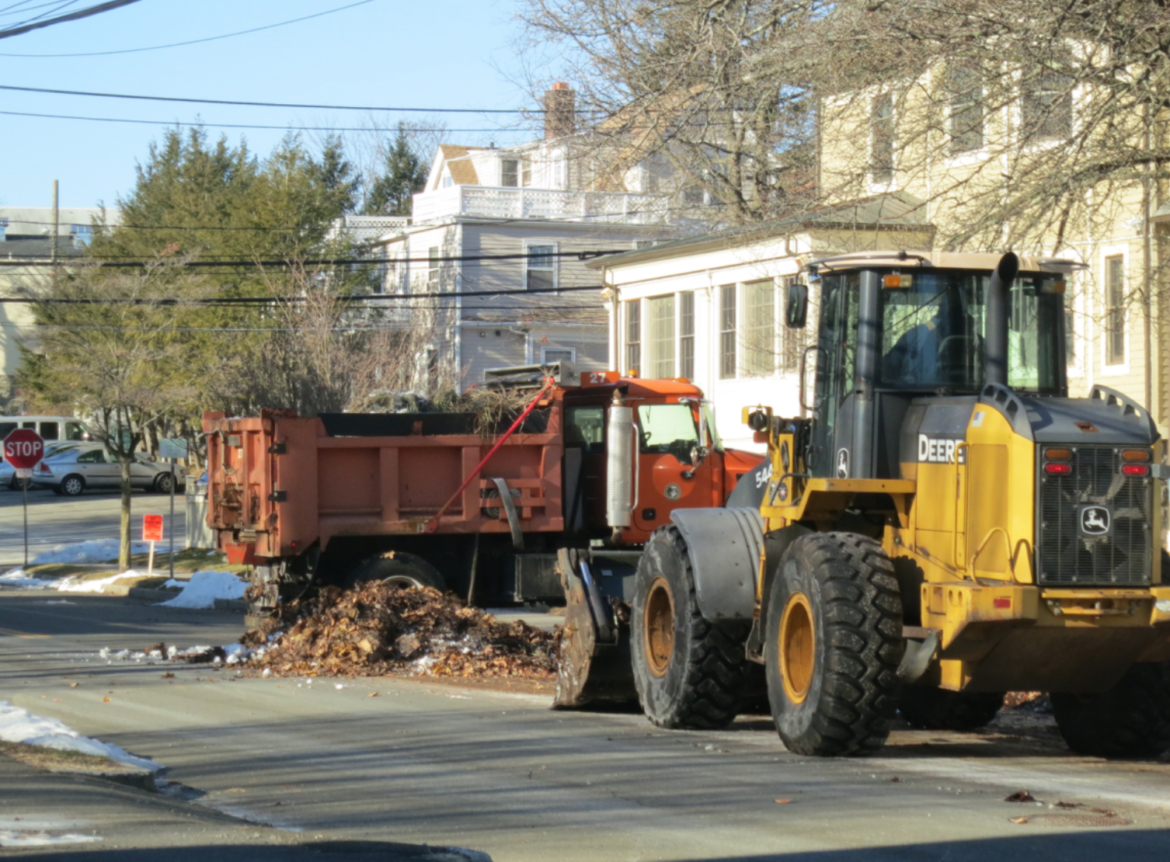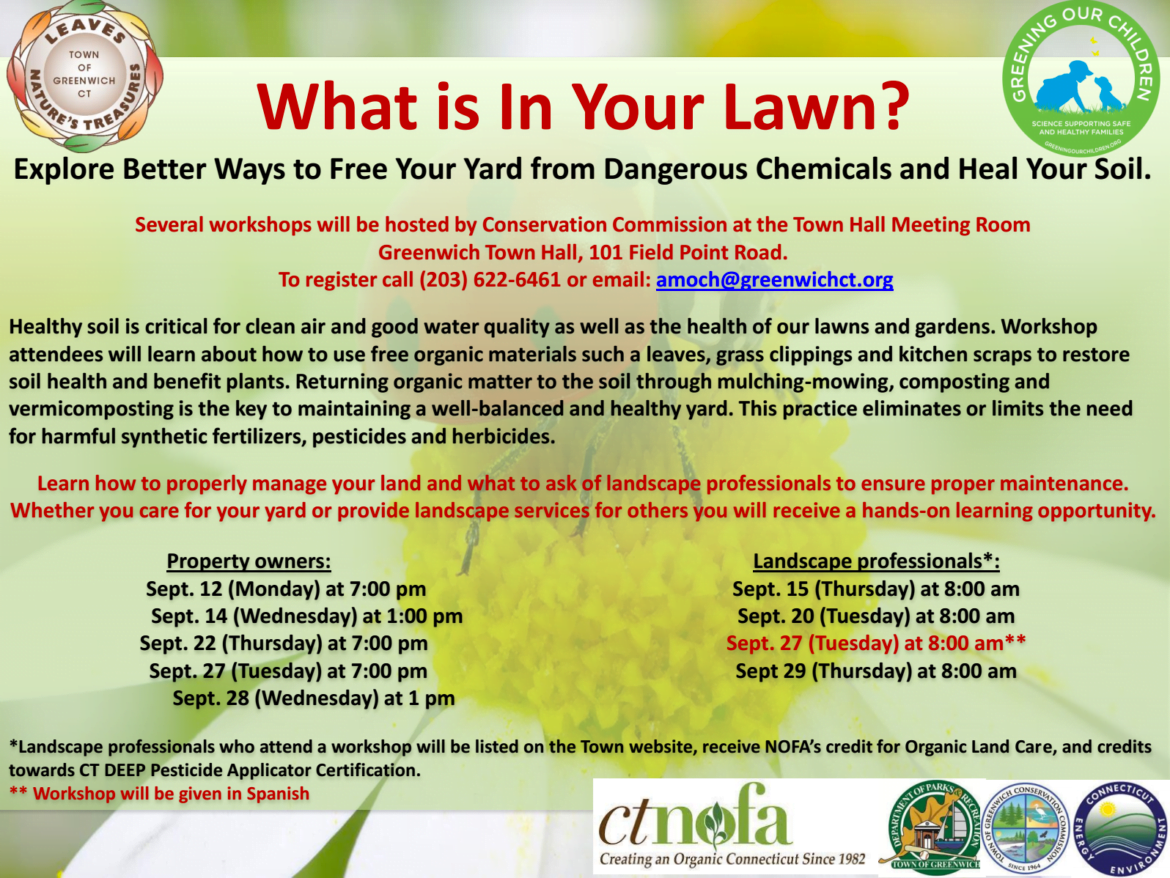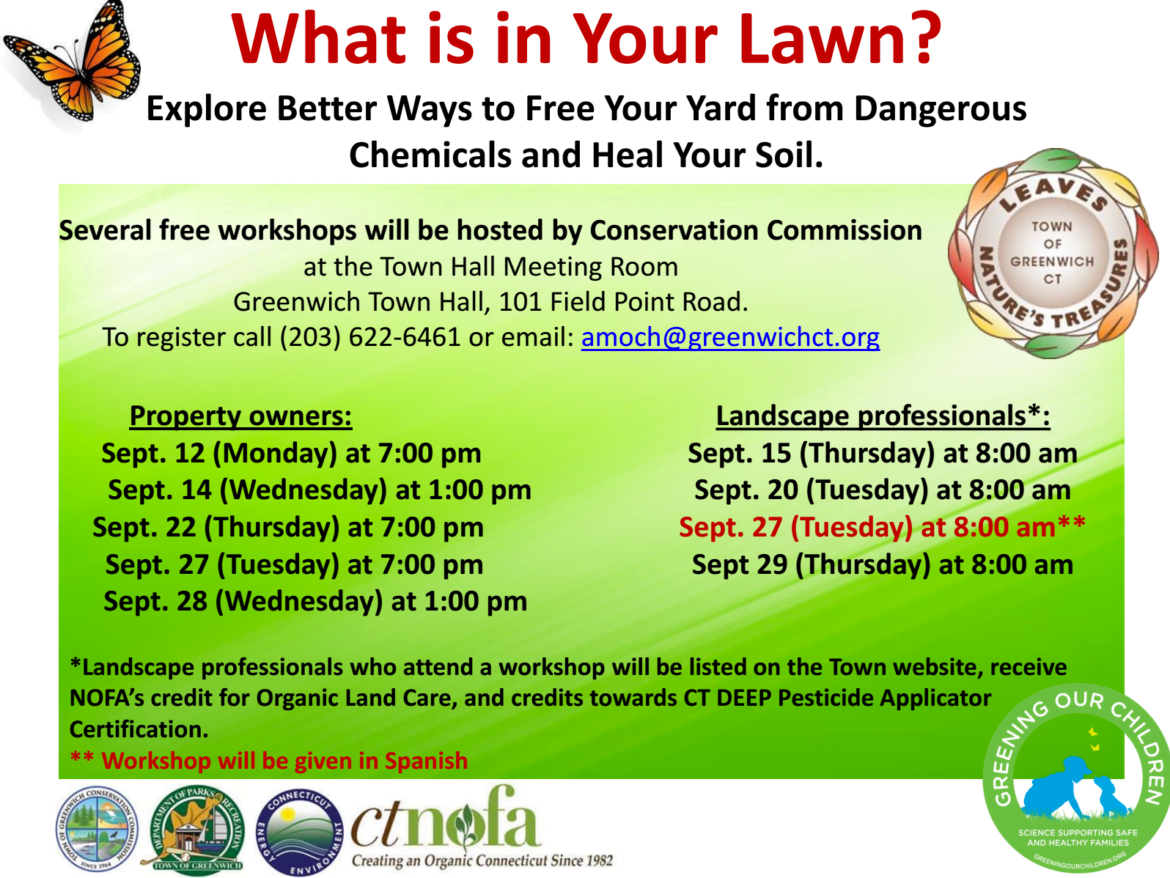 “Nature’s Treasure” is a new organic waste management program in Greenwich.
“Nature’s Treasure” is a new organic waste management program in Greenwich.
The program started with a simple need for reducing or even eliminating leaf piles from Greenwich streets.
Leaves placed along the curbs became challenging because they are narrowing the streets, blocking drains, creating slippery conditions and threatening the safety of pedestrians. Dust, noise and air pollution associated with leaf blowing is burdensome to people with asthma and allergies. Picking leaves up from the street is time consuming and costly to tax payers.
The Greenwich Conservation Commission staff took the initiative to create a program to address all the above and more. As much as cost and safety are important, the environmental benefits of leaf recycling are even greater.
Keeping leaves on the street is equivalent to turning a natural resource into organic waste soaked with street runoff and mixed with trash.
A simple solution to this problem is to recycle leaves on site by shredding them into the lawn together with grass clippings. This approach has been proved to enhance soil structure, microbial balance, moisture capacity, nutrient uptake and organic content. “Cycled” (shredded into the lawn) leaves/grass clippings also suppress weeds and keep the lawn healthy.
Mulching them into the grass saves money and time spent on blowing, raking and piling. In addition, the added organic matter results in a decreased need to use harmful synthetic fertilizers, pesticides, and herbicides. This approach can create a much healthier yard for children and pets. In addition, it reduces the excessive amount of nutrients running off with storm water which negatively affects the water quality of our waterways causing algal blooms in our lakes and ponds.

The Board of Selectman endorsed the program on June 30, 2015 to encourage property owners to recycle and reuse the leaves in their gardens.
At the beginning, the program was intended for property owners living within the Town leaf pick-up areas. Shortly after, it expanded to other neighborhoods and included Town owned properties, especially schools. It was imperative for the Town to lead through example.
A close evaluation of school grounds and their limitations caused the program expand from leaf mulching to include on-site composting. It was noted that some of the school grounds support large trees which yield excessive amount of leaves. Shredding them all to the lawn may be overwhelming for the grass. A solution to this problem was found in the new composting program at schools. Excess leaves provide an excellent source of carbon while cafeteria scraps supply the nitrogen. Mixing scraps of fruits and vegetables together with excess leaves is perfect for making compost and enhancing school sustainability.
Two schools agreed to participate in a pilot program. A comprehensive educational plan was put together and presented to the school principals and both Riverside Elementary School and Eastern Middle School accepted the program. The efforts were implemented by the Conservation Commission and Parks and Recreation staff with strong support and assistance from the teachers, cafeteria workers and custodians. Parent volunteers assisted with the initial monitoring at the school cafeterias. Since the original two schools, the program took off and it was expanded to Central Middle School and Greenwich Country Day School. In the upcoming season, seven more schools will be added to the program.
One of the great advantages of working with schools is the opportunity to teach children early on about sustainability. The combined effort of Parks & Recreation crew collecting the excess leaves from the school grounds and students recycling fruit and vegetable scraps in their cafeteria reduces the generation of organic wastes and allows their reuse as a beneficial soil amendment. Students at Riverside School and Central Middle School apply compost to their vegetable garden. It is important to keep them engaged not only in the compost-making process but also in using compost as a soil amendment. School gardening allows them to observe all the benefits of compost and understand the importance of organic waste recycling.
In 2015, CT DEEP offered the Waste Reduction Initiative Grant Program which the Town of Greenwich applied for and was awarded the maximum grant amount of $20,000. This fund was predominantly allocated to the composting program at schools which included the construction of the outdoor compost bins. The initial bins were funded by a private/public partnership. The bins have been constructed and installed by the Marine Division of Parks and Recreation. The Division of Parks and Trees helps with compost maintenance and use. The grant will cover an additional seven bins. The work will continue during the upcoming season.
This fall several workshops will be offered for both landscape professionals and property owners. The training will be free of charge and allow the landscape professionals to receive NOFA credits for organic lawn care. The participants will be listed on the Town’s website as trained in the new organic waste management program. Property owners will benefit from the new ways of reducing the generation of organic wastes. These efforts will save money and help them to expand the list of reused and recycled items.


Following the workshops, the Conservation Commission staff will reach out to property owners and try to accommodate their limitations and schedules, by offering personal coaching. Coaching will focus on small groups and/or individual property owners. Hands on experience and practical demonstrations will present the options for the best organic waste management practices at each property. In addition, each property owner will receive a free compost bin which will be assembled during the presentation and used promptly to start composting.
After this busy season, composting will return to schools to reinforce the existing program and expand it to new schools. The training will include waste sorting in cafeterias and organic waste management. It is intended to have at least one class on composting (for the six graders) and vermicomposting (for the second graders).
This program was designed by the Conservation Commission Staff and it ties to the current school curriculum.
Most recently the “Safe Lawn” initiatives were adopted in Town. The First Selectman, Peter Tesei endorsed the program at a kick-off event held at the Town Hall on June 18, 2016. Led by a group of concerned parents, “Safe Lawns” has been partnering with the Town to reach out to the property owners and landscape professionals to encourage a more natural and organic approach to landscape maintenance and support for a healthier environment for our kids and pets to play in.
What are the methods for eliminating the organic wastes from the waste stream?
- Leaves contribute the largest amount of organic wastes. It is against the law in CT to burn them or dispose them with your trash. There are two ways to dispose them off in Greenwich. The first of them is to bring them to the Transfer Station. This option is available to all property owners any time during the year.
- The second option is limited to the designated leaf pick-up areas in Town. In this areas the property owners or land maintenance crew are able to place them along the curb during the leaf pick up season.
Other options are recycling and reuseing them in process we call leaf cycling. The best method is to shred them into the lawn when mowing with your lawn mower. Excess shredded leaves could be used as mulch which protects the rood system of shrubs and trees from the frost during the winter time. Shredded leaves could be also used for compost. Blowing leaves to the wetlands or streams will result in excess nutrients running to these systems and prevent vegetation from growing and stabilizing the edges.
See also:
Jackpot! Black Gold Discovered in Greenwich!
Riverside School Parties on Earth Day with Worms, Pill Bugs, Food Scraps and Compost
Greenwich Can Love ‘Em and Leave ‘Em: Composting Initiative Okayed by Selectmen

Email news tips to Greenwich Free Press editor [email protected]
Like us on Facebook
Twitter @GWCHFreePress